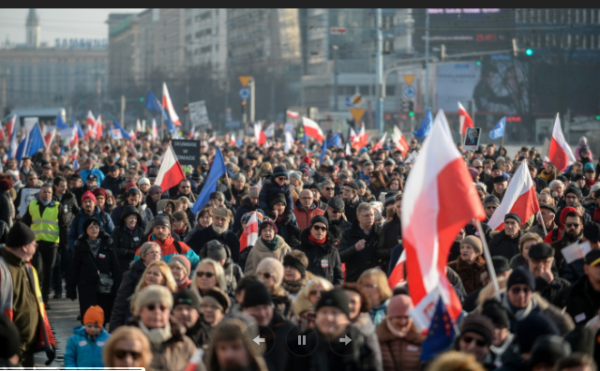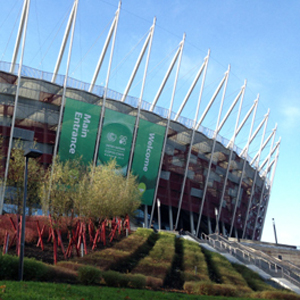 Nobody disputes the new Polish government came to power in fair and democratic elections last autumn. Yet within weeks, tens of thousands flooded onto the streets of Polish cities, protesting the need to ‘defend democracy’.
Nobody disputes the new Polish government came to power in fair and democratic elections last autumn. Yet within weeks, tens of thousands flooded onto the streets of Polish cities, protesting the need to ‘defend democracy’.
The spark was a bill regulating the functioning of the Constitutional Tribunal, whose job it is to check if new laws are in keeping with the Constitution. It was rushed through the Polish parliament (the Sejm) late one December night. Hasty night-time parliamentary sessions are the ruling party’s preferred modus operandi. It was immediately recognized as an attempt to render this third pillar of Polish democracy ineffective. Mateusz Kijowski, a middle aged computer expert, put out a call on social media to rustle up a few buddies to protest outside the Sejm. Some 20,000 turned up, and within days the self-styled Committee for the Defense of Democracy (Polish acronym KOD) Facebook page had 50,000 likes. The following week, half a million joined protests across Poland and worldwide. Since then, street demonstrations have become a regular weekend activity for tens of thousands Poles.
In March, the Constitutional Tribunal ruled that the new law on its functioning runs counter to the Polish Constitution. The government in turn declared their ruling was contrary to the very law being questioned, and refused to publish it. Protestors promptly projected the text onto the Cabinet Office building, started a vigil and one Andrzej Miszk began a hunger strike. The full text was soon on the Internet, but the government remains unmoved. Deadlock.
The ruling Law and Justice party, PiS, has a strong democratic mandate, although not as strong as they like to claim. (37.58% of votes cast, with a turnout of 50.92% comes to 19.13% of the electorate.) They govern without the constraints of a coalition partner and also hold the presidency—Andrzej Duda having narrowly defeated incumbent President, Bronisław Komorowski, last May. PiS immediately set about ‘fixing Poland’ and introducing ‘good changes’, as per their electoral slogan. These came hard and fast.
Creating A New Poland
Under cover of Christmas, new laws on the media and Civil Service were swept in. Polish state TV is now under total PiS control, with a political appointee at its head. Dozens of journalists, managers and editors—some of the best—have lost their jobs. Hundreds of managers and directors of state institutions have been replaced by PiS loyalists. Among the most controversial was replacing the experienced and respected director of the world famous Janów Podlaski Stud Farm with an amateur who naively declared he was ‘looking forward to horse rearing becoming his new passion.’ PiS say, with some justification, that every new government in Poland has wielded the broom. But the scale and speed of the current personnel changes are unprecedented.
Then came a law increasing government access to digital data and loosening restrictions on police surveillance.
Next, in order to prevent Poland being bought up by foreigners, from May, only local, qualified farmers will be allowed to buy farmland. It is expected the land prices will fall, investment halt and farmers join the ranks of protestors. (Word has it this law will be modified, but that remains to be seen.)
In April, came the proposal to change Poland’s already draconian law on abortions outlawing them altogether, along with in vitro fertilization.
The Minister of Justice has combined his office with that of Public Prosecutor, a further constraint on the independence of the judiciary and another step towards the elimination of checks and balances.
Also in the pipeline is a new, armed paramilitary unit of 35,000 volunteers—a ‘Territorial Defense Army’ tasked with, says the Defense Minister, ‘strengthening the patriotic and Christian foundations of our defense system’. Advocates of the idea deny the paramilitaries will be used to suppress homegrown political opposition but claim their job will be to safeguard against the dangers of mass immigration. Not exactly a reassuring argument.
The one reform that has been widely and warmly welcomed so far, is the promised benefit of 500 złoty paid for every second and subsequent child. The government claims it has funds for this, but has so far reneged on its other election promises to lower the pension age and reduce income tax.
But it is not the economy but worldview and history that are the real issue.
Compromise, Catharsis, Communists
The Third Polish Republic (III RP)—that is post communist Poland—is a sham, says Jarosław Kaczyńksi, PiS party chairman and the man who really rules now. Both the President and Prime Minister owe their positions and defer to him.
The PiS view is that the III RP is flawed from its inception, born of a compromise deal cut by the Solidarity opposition and the Polish communist party in 1989, which in effect, they say, allowed communists to keep hold of power. Moreover, by securing the communists a sizeable chunk of seats in the first partially free elections, even when they were wiped out in the polls, Poles were denied a sense of victory and catharsis.
It is true that, even after the Soviet bloc fell like dominoes, Polish communists were, on the whole, left in peace. Poland had no Truth and Justice Commission. The historic compromise was part of the non-violent ethos of peaceful revolution encouraged by Pope John Paul II and fundamental to the Solidarity movement. PiS cares not that it prevented bloodshed and allowed for a smooth transition, and has skillfully tapped into the resentment and sense of unfinished business that has festered since.
Few would claim the past 26+ years have been perfect. But it is honestly hard to recognize the picture of Poland Kaczyński and his team painted during the elections last year of a country in ruin, run by a network of communists and their henchmen. PiS have a binary view of the world; either you are with us or against us. There are good, true, patriotic Poles and the ‘worst sort of Poles’, to quote Kaczyński, those who don’t agree with PiS and have no right to carry the Polish flag. Sadly, bridge building and dialogue are not much in evidence.
A New History
For PiS, history is a political instrument. Just as Poles seemed to be emerging from the Soviet icebox and reclaiming and airing their history with all its myriad shades of good, bad and grey, we are back to a dangerously simplistic, propagandistic version of victim/hero patriotism. This view is to be enforced by the revamped and re-staffed Institute of National Memory. An illustration of things to come is the recent five-hour interrogation of historian Jan Gross by a Polish prosecutor investigating whether he had criminally insulted the Polish nation. (The alleged insult is Gross’s claim in Dei Welt last year that Poles killed more Jews than Germans during the second world war, mentioned in the context of discussing Polish reluctance to take in Syrian refugees.) The interrogation followed moves to revoke Gross’s order of merit awarded in 1996 (five years before his first controversial book on Polish Jewish wartime relations). Whatever one’s views, freedom of expression is a cherished democratic right.
The black and white heroic version of Polish history sells well and has energized many of the young generation. When back in 2011 violently aggressive anti government slogans were raised attacking the then PM Donald Tusk at a football match, Kaczyński spoke out defending the supporters’ rights to political views. Polish Independence Day celebrations on November 11th began drawing vast crowds, dominated by assorted football supporters, becoming mass nationalist demonstrations which most often turn into running battles with antifascist groups and the police.
The new chauvinistic and aggressive form of nationalism has support in certain quarters of the Catholic Church. The hierarchy has long tolerated the politicized Father Rydzyk, who employed his influential ‘Radio Maria’ at the service of PiS’s election campaign. Now, there are priests who openly support overtly fascistic displays, such as the notorious burning of a caricature effigy of a Jew in Wrocław last November. On 16 April, the same priest officiated at a mass in Białystok cathedral celebrating the ONR (the National Radicals, an openly fascist organization, banned in pre war Poland almost as soon as it was set up) with a full-blown parade with flags and party regalia. Incidentally, the ONR are very keen to volunteer for the new paramilitary units described above. It took three days for the Polish hierarchy to respond. The Episcopate stated that it was against ‘churches being used for anti-Christian proclamations’. The press spokesman for the Białystok Archdiocese published a lukewarm apology on the Curia website to ‘those who felt offended by’ events at the Cathedral, which were the result of ‘an administrative oversight’. The Church in Białystok is ‘non political and not pro nationalist’, he said.
Us and Them, Them and Us
PiS claims that their critics are merely the disappointed beneficiaries of the old regime, mourning their loss of power and influence, angry at being ‘torn away from the trough’. They give no credence to any another view of history and statehood than their own. A government that defines only one acceptable type of citizen and excludes social, religious and ethnic minorities can hardly be described as democratic. The problem is that to many Poles right across the social spectrum, this is just fine.
It is true that many got left behind when communism fell. There are whole swathes of small Polish towns, which lost their uneconomic and outdated state enterprises leaving the workforce with nothing to do and nowhere to go other than abroad. With no serious left wing party on the scene to look out for their interests, PiS appears to be the only one to do so. Many Poles—and not only the church goers who are all too often fed a diet of anti-western anti-EU propaganda from the pulpit each Sunday—do not care for neo-liberal economics and a liberal lifestyle. The ‘give PiS a chance’ camp was large enough to get them into power.
There is a yawning chasm between PiSophobes and PiSophiles, steadily filling with virulent bile. Alternative views exist (like the new small leftist party ‘Razem’) but are barely audible. Meanwhile, PiS continues to stay high in the polls. Clearly, they are speaking to and soothing the bruised and battered Polish soul.
As I write [end of April 2016] the impasse between the government and Constitutional Tribunal continues. Uncertainty and chaos are beginning to seep into the judicial system and the vigil outside the Cabinet Office continues. KOD is now registered but cannot do much more than demonstrate and educate. The political opposition parties have clearly not yet got their acts together though discussion clubs are sprouting across the land. People will need someone to vote for in the next election… providing there is one, say cynics, aware that the electoral law could also undergo modification and three years is a very, very long time in politics, as we have seen from the six months of PiS rule so far. Is Poland’s democracy strong enough to survive?
CR




Wanda, thanks so much for your detailed and insightful review of the current political situation in Poland, which beats the few English-language media articles I’ve seen by a country mile. I share your concerns about the direction in which the current government is trying to draw the country and hope that common sense will prevail over political pride.
Interesting and well written. I would add that cutting the budget of the Human Rights Representative (the Ombudsman) on January 28th 2015 was another example of weakening democratic protection for Polish people. (cut by 10 million zlotys or 3 million dollars.)
Pingback: Time Travel | maria's poetry blog